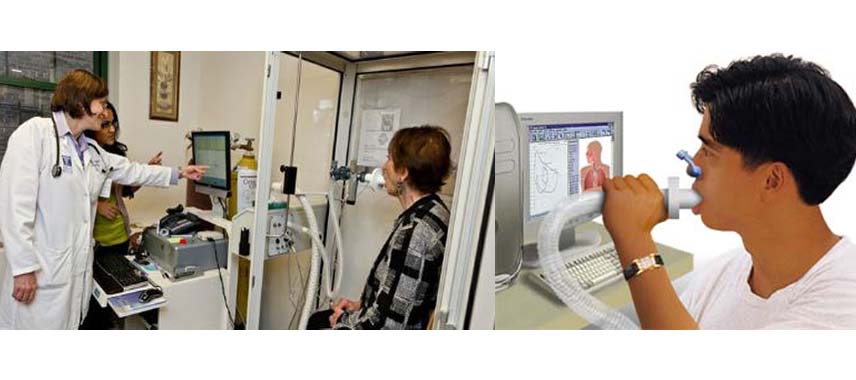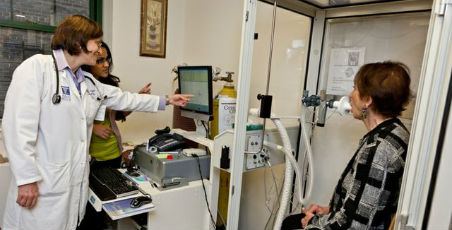
Pulmonary Function Tests - PFT
Pulmonary function tests are a series of tests which evaluate how well your lungs are performing. A physician referral is required.

The pulmonary function lab performs several tests to evaluate the following:
• COPD
• Asthma
• Chronic cough
• Shortness breath
• Cystic fibrosis
• Pulmonary fibrosis
• Pre-operative evaluation
• Pulmonary hypertension
• Vocal cord dysfunction
Various forms of pulmonary function tests
• Spirometry:
Simple test to measure basic lung function. Can be used to evaluate bronchodilator response.
• Lung Volumes Through Body Plethysmography, Nitrogen Washout or Helium Dilution:

• More detailed tests measuring total lung capacity. Airway resistance can be measured through body plethysmography.
• Diffusion Capacity:
Measures the ability of the lungs to diffuse oxygen into and carbon dioxide out of the bloodstream.
• Arterial Blood Gas:
This test measures the amounts of oxygen and carbon dioxide and the pH of an arterial blood sample.
• Oximetry:
Evaluation of oxygen saturation at rest and with exercise.
• 6 Minute Walk Test:
Functional status test used for establishing baseline as well as monitoring progress.
• Maximum Inspiratory and Expiratory Pressure:
Evaluates respiratory muscle strength.
• Maximum Voluntary Ventilation:
Evaluates respiratory muscle strength over a one minute duration.
• Provocation Study:
Test to evaluate for asthma using medication to provoke bronchoconstriction.
• Exercise Induced Bronchospasm Studies:
Test to evaluate for exercise induced asthma using monitored exercise to provoke bronchoconstriction.
• Modified Shunt Study:
Estimates the portion of a patient’s blood flow which does not participate in effective gas exchange within the lungs.
• Direct Laryngoscopy with Exercise:
Test to evaluate for vocal cord dysfunction.
Before Your Test
• Refrain from taking bronchodilator at least four hours before your test.
• If exercise is indicated, wear comfortable loose fitting clothes and comfortable shoes for exercising on the treadmill.
• Be prepared to tell the respiratory therapist:
o What medications you are taking, including inhalers and nebulizers.
o Allergies to medications.
o Smoking history including how many years you smoked and how many packs per day.
o Occupational history for potential exposures.
During Your Test
• You will be sitting in a chair and breathe through a mouthpiece. The respiratory therapist will instruct you step by step throughout the tests.
After Your Test
• You may return to your normal activity.
• A pulmonary physician will evaluate your studies and a report will be sent to the ordering physician.
References:
• http://www.webmd.com/lung/lung-function-tests
• http://www.uptodate.com/contents/search?search=Pulmonary+function+tets&x=0&y=0







